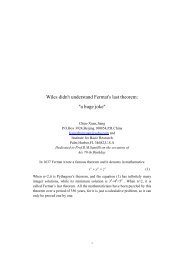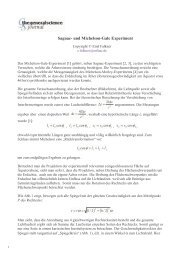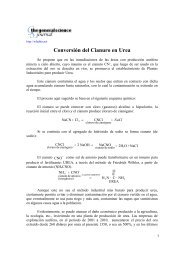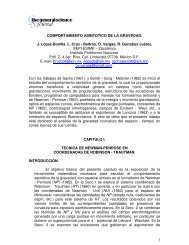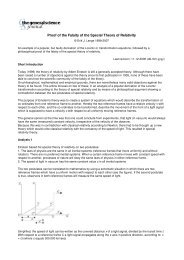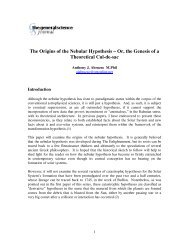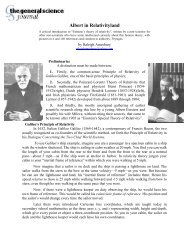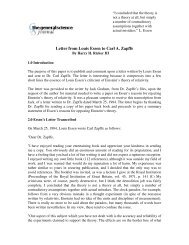MAGNETISM DURING THE SEVENTEENTH CENTURY HH Ricker III
MAGNETISM DURING THE SEVENTEENTH CENTURY HH Ricker III
MAGNETISM DURING THE SEVENTEENTH CENTURY HH Ricker III
Create successful ePaper yourself
Turn your PDF publications into a flip-book with our unique Google optimized e-Paper software.
claimed to have revealed the precise truth, thereby greatly impeding the discovery of true<br />
knowledge.” 15<br />
Descartes idea of nature as an automatic machine was a lasting idea that still influences physical<br />
thought. But, he failed to understand the idea that true knowledge of nature can only be obtained<br />
through observation and experiment.<br />
A second major flaw in Descartes philosophical system was his rejection of the concept of force<br />
as a cause of motion. We saw earlier that Isaac Beeckman rejected the notion of an attractive<br />
force in magnetism. Descartes adopts this same viewpoint and attempts the construction of his<br />
system of natural philosophy without the notion of force, which he believed had no place in<br />
physics. His attempted physics would be based only on mathematical principles as he tells us in<br />
the Principles of Philosophy:<br />
”I do not accept or desire any other principle in Physics than in Geometry or abstract<br />
Mathematics, because all the phenomena of nature may be explained by their means, and sure<br />
demonstration can be given of them.” 16<br />
Here he is insisting that only the principles drawn from geometry and mathematics will be<br />
admitted into his system. This, of course, is not the case, because he must introduce some<br />
assumptions regarding nature in order to describe it mathematically, but we see the underlying<br />
reason that force is excluded as an explanatory concept. Only the sure and certain principles of<br />
mathematics can be trusted.<br />
The concept of force is excluded by Descartes and Beeckman because it implies or carries with it<br />
an occult conception. Force is either an unseen entity or a fictitious appearance. It is a<br />
fundamentally Aristotelian conception. Force as a cause of motion, implies that it is a potential<br />
quality. It causes alteration of quality in order to cause motion. Descartes program is to rid<br />
natural philosophy of all these suspect notions. Since force appears as an occult or Aristotelian<br />
cause it has to be excluded from the new mechanical philosophy. Descartes tries to exclude and<br />
abolish it, using it as a fictitious appearance not as a physically real conception. This program is<br />
a major source of difficulty, because it results in a physics based only on a kinematics of matter<br />
based on vortex motion without any dynamic principles; an approach that was doomed to fail.<br />
Descartes founded his physics upon the principle that apparent force can only be communicated<br />
by pressure or impact of a material body. This required that all of space must be filled with<br />
matter. But, this matter was not like the ponderable matter of the earth, it was a subtle matter that<br />
filled space and transmitted forces. This idea is the first appearance of the concept of the aether.<br />
This aether, or subtle medium penetrated all ordinary matter as well as the space in the heavens.<br />
The circulation of the vortices of aetherial matter accounted for the motion of the sun, moon and<br />
planets, as well as the transmission of light and heat from the sun and stars. Descartes magnetic<br />
theory was founded upon this idea of space as a plenum filled with aether, but his magnetic<br />
matter was not the same as the aether, it had its own peculiar nature. 17<br />
The Cartesian magnetic theory was based on the classical Greek theories of emanations and<br />
pores, suitably modified and extended to fit within the Cartesian system of natural philosophy.



